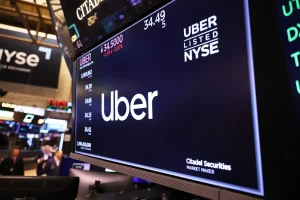This afternoon, Uber drivers won the right to be classed as workers rather than self-employed.
The ruling by a London employment tribunal means drivers for the ride-hailing app will be entitled to holiday pay, paid rest breaks and the National Minimum Wage.
Steven Eckett, employment solicitor at Gardner Leader solicitors:
The Employment Tribunal's decision to class these particular Uber drivers as 'workers' rather than 'self-employed' will have repercussions throughout the gig industry and is highly likely to lead to a rethinking of the employment status of these workers and with it, a clarification of their employment rights. It is also likely to impact on Uber drivers in the EU who are also bound by the Working Time Regulations.
Decision sheds clarity on definition of worker
The gig economy has thrived on companies using a pool of self-employed or freelance workers rather than directly employing them but this has, at times, led to a misunderstanding amongst various businesses over who is classed as self-employed and who is classed as a worker. The difference has a significant impact because workers in law have a range of employment rights that they are able to enforce.
People are classed as workers when there is a mutuality of obligation on the part of the business to provide work that these workers are obliged to undertake, with a degree of control by the business as to where, when and how the work is to be carried out. This contrasts with genuinely self-employed contractors who are usually free to accept or decline work.
Greater cost to the 'gig' industry and consumers
The employment tribunal's decision today certainly sheds clarity on the employment status of this new breed of ‘freelancer’ currently fuelling the growth of the UK gig economy. However, consequences of the judgment is likely to result in increased costs to the gig industry in order to comply with the new employment laws, and it's probable that these will be passed on to the consumer, such as through higher fees, delivery rates and prices for goods and services. The service industry like couriers, fast food delivery companies and portable cleaning operators are likely to be hit the hardest.
Workers, not to be confused with employees who have greater employment rights in law, are also entitled to minimum legal rights. These include for example, the right to claim unfair dismissal, to receive statutory sick pay maternity, paternity and parental rights; to be paid the national living or minimum wage depending if they are aged 25 or more; to have working time rights such as not to be forced to work more than 48 hours per week, regular rest breaks and night working health and safety standards; to receive a statement of terms and conditions of employment.
Further, Uber will need to have a qualifying auto-enrolment pension scheme in place and backdate any pension contributions.
There is also the issue of immigration. If those you hire are classed as workers then the burden to vet them will be on the business to ensure that all those individuals have the right to live and work in the UK. Failure to do so can lead to fines and ultimately criminal sanctions against the business and also the individual, not to mention the risk of bad publicity should the business fail to compile to any minimum legal employment rights.
Take action
Businesses concerned as to how this ruling may affect them should seek timely legal advice on their recruitment policies and procedures to ensure compliance with the law. It is also imperative that they issue written terms and conditions to these workers clarifying pay rates, hours of work, role and responsibilities, sickness provisions, holiday entitlement and health and safety and equal opportunity policies. It is also no good having a succession of fixed term contracts either to get around the law as after the fourth renewal of a fixed term contract it will be deemed to be permanent.
Kathryn Dooks, Employment Partner at Kemp Little LLP, said:
Two Uber drivers today won their employment tribunal claim against the “gig economy” app. The decision means they are classified as “workers”, entitling them to the National Living Wage (£7.20 / hour for drivers over the age of 21), paid holiday, sick pay and rest breaks, amongst other rights.
The claim revolved around the level of control exerted over the drivers by Uber. Uber claimed that the drivers were self-employed, choosing when and where they worked. It argued that many of the drivers wanted to be self-employed, so they could be their own boss and work completely flexibly. However, drivers can be suspended for not accepting enough rides or for low passenger ratings following a drive, leading to arguments about the nature of the relationship.
Uber faced similar claims across the USA and lost a case in California in 2015, leading the company to try to settle numerous other claims across the US earlier in the year. By contrast, the Florida Department of Economic opportunity previously ruled US Uber drivers were independent contractors, meaning the drivers were not eligible for unemployment insurance.
The outcome of the English employment tribunal case could have a significant impact on the business models of companies like Uber, Deliveroo and other apps which match service providers to customers. For this reason, the decision is certain to be appealed by Uber. In the meantime, Uber can expect a large number of claims from its drivers following this test case and other apps can expect similar claims. The courier firm City Sprint is already facing a hearing on the same point in November. No doubt many such businesses will be reviewing their working practices to see whether they can avoid the implications of the decision. But these attempts may be futile in the longer term as the government has announced an independent review of the law in this area, to be conducted by Tony Blair’s former policy chief, Matthew Taylor, which seems to signal a more interventionist approach.
Jamie Lester, Partner at Lincoln's Inn law firm Hunters incorporating May, May & Merrimans:
This is a decision which will no doubt be the subject of appeal and potential further appeal, given the huge ramifications to Uber’s current business model which might now be unsustainable.
(Sources: Gardner Leader, Kemp Little, Hunters)




















